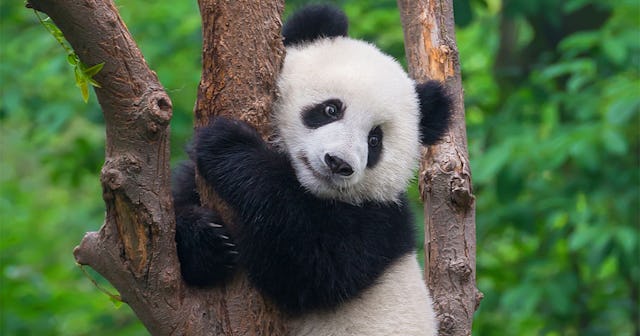How I'm Finding Pandemic Solace In A Panda Cub

It is 3 p.m. in the middle of the workday and my boss needs two things from me. One, I’ve finished. The other I haven’t started yet. In the back of my mind, my worries about all of the other things —the pandemic, my parents, my kid at home in front of the computer, my kid navigating the first year of college — continue in a mad loop. There aren’t enough Lysol wipes to clean off a literal merry-go-round, so that loop is the closest thing I have.
I turn, as I often do these days, to the Smithsonian’s panda cub.
I have not always trusted the National Zoo’s panda as a beacon of soothing consolation, especially after one of the previous cubs died at a few days old, leaving D.C. in mourning. But after two weeks, with the cub growing rounder and longer, I tuned in to the panda cam.
Click.
I try to count Mei Xiang’s breaths as she snuggles her little one in their den. At two in the morning, awake, heart racing because of a dream? A reality? I tune in again. Mother and cub are asleep, and maybe, I think as I watch, I can go back to sleep, too. In the morning, the real morning, sanctioned by the sun, I consider the fact that pandemic and panda both begin with the same four letters.
Another week passes. I am grateful to have a job that keeps me focused on other people and not on the things I’ve missed since the pandemic started. A graduation. A school play. A birthday. A funeral.
At the dinner table, where we all sit because there’s no basketball practice, no live radio show, no track meet, the conversation goes like this:
How was school?
Boring. How was work?
Fine.
I call my mother-in-law who has seemingly spent the last three months sweeping her driveway of leaves. The only other new things to talk about are aches and pains that weren’t there before. But then, I think: what about the panda?
“The new cub is teething,” I say. I remember giving my own children frozen bagels, which did not have the seal of approval from parents’ magazines.
“Mei Xiang is the oldest panda in the U.S. to give birth,” I say. As someone whose file was marked “advanced maternal age” when I had my own kids, I feel for her.
The cub is 8.4 pounds. Then 9.2. His tail is 2.3 inches long. I repeat these facts as if they are front page news — and D.C. being D.C., sometimes it is. On the panda cam, more than 1.5 million people have tuned in, so I know I am not alone at 11 p.m., at midnight, watching the cub and his mother sleep.
Colleges do not have cameras that allow us to watch our children sleeping in their dorm rooms, but on Sundays, we have a family skype and I am slightly reassured that my own child is, at least, eating properly.
Another day. Another anxiety. But this time, when I tune in to the panda cam for comfort, the cub is alone in the straw. Mei Xiang has gone into the other part of her habitat. THIS IS NOT REASSURING. The cub rolls a little and kicks his back feet. His head seems too close to the bars. I know, of course, that Mei Xiang is entitled to go eat some bamboo. But like others who are using the panda cam as a sort of Xanax, I stand guard until she returns. The calm I’ve felt watching them sleep is gone.
Mei Xiang does return. She nuzzles her cub and lies down beside him. I look through photos from when my kids were young and laughing instead of locked in their upstairs bedroom, a midwestern dorm. As the weeks go on, Mei Xiang starts staying away longer. The cub grows older. We all grow older.
A few weeks ago, the cub got a name, Xiao Qi Ji, a Mandarin Chinese name that means “little miracle.” It’s the name I voted for, so I feel a sense of ownership here. My college student returns home for Thanksgiving with a negative COVID test. There are new scraps of conversation at dinner. My sense of calm starts to return.
The cub learns to crawl. He is starting to take a few steps. Soon he will be able to follow Mei Xiang out of the den. Soon, he will be able to leave the den on his own. Eventually, he will go to China, a part of the partnership deal between country and zoo. But he’s here now. As the pandemic continues, I pile every metaphor I can onto his furry shoulders. He is learning to crawl his way out of this, I think. I hope that the rest of can crawl our way out, too.
This article was originally published on